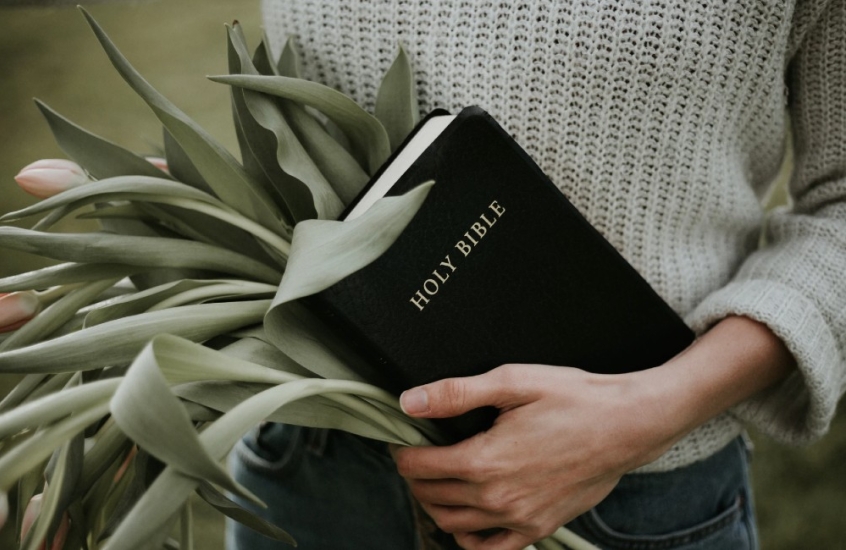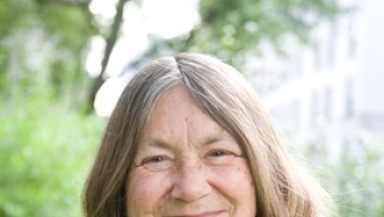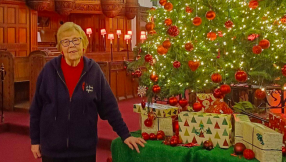
Elaine Storkey, Christian feminist and author of Women in a Patriarchal World, speaks to Christian Today about women in the Bible and whether there are any glass ceilings left for women in the Church today.
CT: You use the word 'patriarchal' in the title, which is a very loaded word in today's culture and quite divisive. Why did you feel it was appropriate for the book?
Elaine: Because that's the word that is usually used by people who are levelling accusations against the Bible as a whole - that it is a patriarchal document that was written by men for men, and if women turn up in the scriptures, they're always presented to us by men. So everything is interpreted through male eyes.
Of course 'patriarchy' itself has gone through many different definitions from the time that [Max] Weber first introduced it into sociology, where it meant really a kind of kinship network based on the dominance, rule and leadership of the father in organising the household. For Weber, it was really a description of work and of household living. And he intended it to be quite neutral; it wasn't intended as a slur.
Then the feminists took it up and talked about it in terms of male dominance and male rule, with Mary Daly claiming that patriarchy was the prevailing religion of the entire planet. Her argument was that it didn't matter what religion you belonged to; if you were religious at all, you were upholding patriarchy because all religions are male dominant with women being subservient, and the identity of women being interpreted for them by men and seen through male eyes.
'Patriarchy' and 'patriarchal' are still very common in feminist circles today, but many of them wouldn't touch the Bible because they think: well, why would I want to read a patriarchal document that actually spends all its time running women down and making sure that they've got no life!
Of course society in the Hebrew scriptures was patriarchal in that it was founded on the patriarchs - Abraham, Isaac and Jacob - and society was founded around the tribal allegiances and developments. So it is a patriarchal world and I accept the feminist argument that almost all societies are patriarchal in some sense or another.
God speaks in a different way from the way human beings speak and that's why I don't think the Bible is a patriarchal document. I think it's much more complex than that. But I wanted to go with that term deliberately rather than pretending I was doing something else, because it is a rather 'in your face' term!
CT: The women in your book lived thousands of years ago but do you see reflections of those ancient contexts in the modern Church today?
Elaine: I do see some reflections but just as in the ancient times, it wasn't simply going in one direction. Some churches today are very patriarchal. They give no space to women and if they're going to be squeezed into any form of leadership, it's only on sufferance.
Sometimes it's through ignorance of how to interpret the Scriptures rather than a willingness to actually make women subservient that can drive these decisions. There are of course some churches where patriarchal attitudes are so ingrained that they are quite hostile to women and are determined to shut women out of any form of preference, but those are few and far between. Most churches, even very conservative churches, want to be obedient to the Scriptures and this is how they read the Scriptures.
So yes, we do still see it in churches, not just in forms of leadership but sometimes in terms of what women have permission to do and whether women have any real insights to give us, because we all know that God gave the revelation to men!
CT: Do you think that the stories that have come down to us through the Bible of the women may have been told differently if the women had been able to write them themselves?
Elaine: Most of the writers that we know of have male names and identities but when you look at what they're saying about women and men, it's very interesting. If we do believe - and I do - that God is speaking through these authors, sometimes they're saying very detrimental things about men and very complimentary things about women.
Even Abraham is presented in rather a shabby way, trying to pass his wife off as his sister. Even in the patriarchal system, you find it's the men the writers are decrying. So the story isn't always told in a way that is complimentary to the men.

But also the passages are pointing out the insights that the women have had so where are they getting the information from? Especially in the New Testament, the only people present in the moment of interaction was Jesus and the woman concerned. So where does the story come from? Well, it's almost certainly the woman's story and she was there passing it down the disciples and the scribes who were writing it down - because we know Jesus didn't dictate the scriptures, and the oral tradition was that these would be the women's stories.
For example, the woman of Samaria would have told her story because we know from the scriptures that the disciples came back later. So a lot of the stories really are women's stories and are passed down presumably through male scribes, but frankly that doesn't matter. And they are told sometimes in a very negative way to the men. We see, for example, Jesus rebuking the men for not realising He's been raised from the dead and so He tells them off for not believing the women!
CT: Do you think there are instances in the Bible where the the patriarchal mould was broken perhaps more than we are doing today?
Elaine: I think they did even in the resurrection. I think it's very interesting that the people in the tomb and who saw the stone rolled away and encountered the angels in all four Gospels were women. Women were there first; they were the first ones to receive the resurrection message; they were given the kerygma and the task of proclaiming the Good News.
Why would God take that risk given the culture of that day when the woman's word, even in a legal situation, had to be corroborated. You didn't believe a woman just because a woman said it. She either had to have a male corroborator or a number of women affirming the same thing, whereas men didn't need to do that. Their word was taken much more for granted. So I think it was interesting given the legal, the ecclesial and the Jewish situation that the first people to receive the good news of the resurrection from Jesus and angels were women. That ought to tell us something about the way we need to operate today.
Why do it that way? It's partly because God was honouring women's roles and women's roles in those days were to do things like embalm the corpse. Suddenly these were no longer women's roles. They were women with an incredibly important message to get out to the world. That stands out a mile, but there are other areas in the Hebrew scriptures where the women very often have to remind the men they've got it wrong, or they need to take control, or they are smarter and wiser.
I love Abigail because she is saddled to this most obnoxious man and most of her life seems to be spent avoiding all the conflict and bloodshed he could cause by his churliness.
So I think a lot of the time we need to look to the women for leadership rather than to the men because they get it horribly wrong over and over again. Who's going to follow someone who's got 700 wives?! As I said, the Bible's much more complex than simply being a patriarchal document.
CT: Your book doesn't go into every single woman in the Bible. What inspired this particular selection? Is there a common thread?
Elaine: Yes, the common thread was women who faced challenges that there seemed to be no way out of but then managed to rise above them.
CT: Do you think any of these women have been overlooked or sidelined in the Church?
Elaine: Well, I think a lot of them we've never even heard of frankly! Even I hadn't and I'm old and have been reading the Bible all my life! I think I was 50 before I came across the five daughters of Zelophehad and it was through a very whimsical friend who said: 'You can't be reading Numbers very much!' Which was true, I hadn't been reading Numbers very much!
And I think a lot of us in the Church are like I was then. So it's not that these stories are underdone, it's just that we've never heard of them. And we can't see why the Book of Numbers is of any significance to us today, even though it really is - there's heaps of stuff in there.
Rahab always brings a smile to my lips because she is the one woman who passes all the tests in the New Testament and is praised by the writers of Hebrews and the book of James, one praising her for her works and the other for her faith, but she was a prostitute and a traitor! So again, what does that teach us in the Church? I think it's to withhold judgement a bit more and look very carefully at what matters about a person and how God uses a person irrespective of what we think about them!
CT: Do you have a favourite woman in the Bible?
Elaine: It's probably Priscilla because she is such a teacher and is obviously up to the job. I don't know what her relationship was like with Aquila but in all the passages by Paul and Luke, her name comes first which is really counter cultural, so she is obviously quite a star. And I would love to know what drove her. Obviously it was the Holy Spirit but what did she have to encounter that we don't know about because there had to be lots of things.
And then of course the other was Lydia. She just opened her heart to God and was kind of waiting for Paul to turn up. The moment he turned up she knew that was it and the Gospel was in front of her. And of course, I like the quirky Hebrew midwives too. It takes gutsy women to tell the Pharaoh to clear off.
CT: The Church of England has changed a lot over the years of your ministry. There were first of all women priests and now there are women bishops. Thinking about the Church of England, do you think there are any glass ceilings left for women or can we say we've 'got there'?
Elaine: I don't think there are any restrictions now on women in the Church of England and I've been in the Church of England for most of my life. I was on the General Synod for 28 years and I believe God was leading the Church into greater openness towards women, and greater use of the gifts that are there in the Church - because what a waste otherwise.
Technically and legally there aren't any restrictions on women. They may go where God leads them and as long as people are there praying for the guidance of the Holy Spirit, doors will be opened.
Having said that, there are patches of the Church, whether that's high catholics or conservative evangelicals, that still want to resist, usually for theological reasons, sometimes for psychological reasons because they just feel very uneasy about 'taking orders from a woman', as they once kindly put it to me! They don't see it as taking orders from men but they do when it's a woman.
So you have these pockets that are there but that's different from looking at the structure of the Church as a whole. In the Church of England women can do anything that God leads them to do. What stops them is still the anxieties of some people in some of the congregations and I think fewer and fewer people are like that. I noticed a big change when we first ordained women to the priesthood and it changed very quickly as people got used to women priests and discovered that there wasn't thunder and lightning, and the church didn't explode but rather women were doing ordinary work-a-day jobs.
But I will say one thing, though. I think the status of priests and bishops has dropped since women came into it. We no longer see these people with great awe from a distance, we just see them as ordinary work-a-day people who are doing a job in the Kingdom of God and that in itself is interesting, Women somehow have levelled the whole profession off and made it something different.













